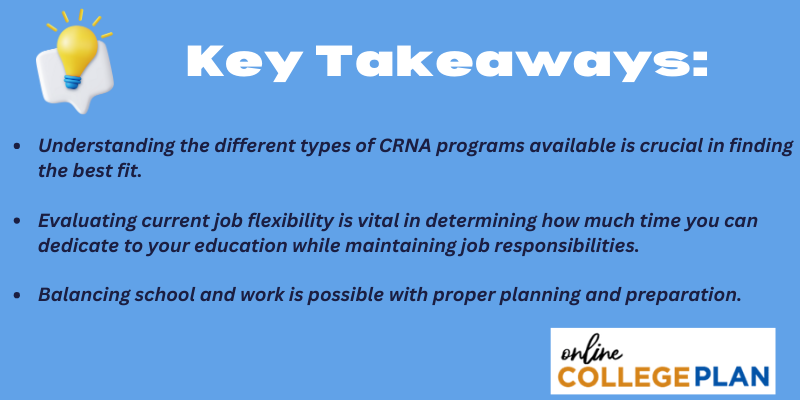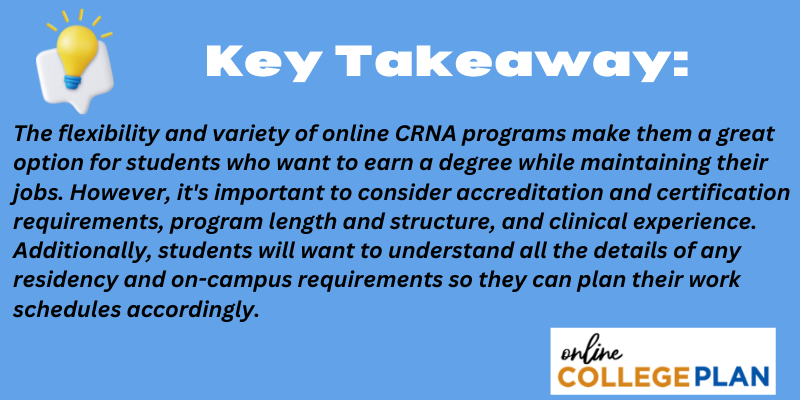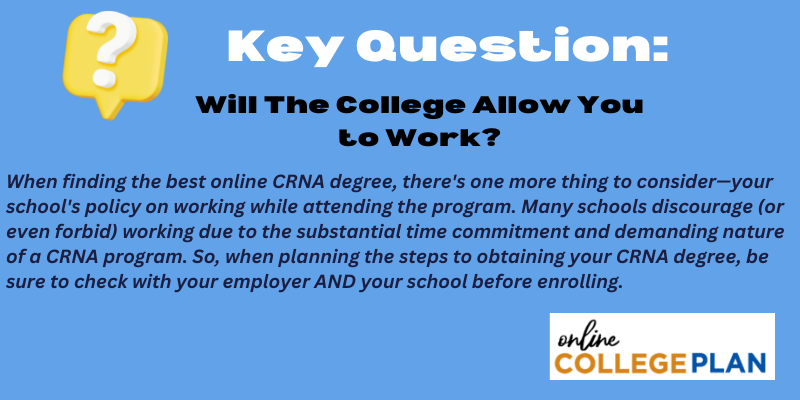What Are the Best CRNA Schools For Working Professionals?

Find your degree
Finding the best CRNA school to attend while maintaining a current job can be challenging. There’s an increasing demand for certified registered nurse anesthetists, so finding an anesthesiologist online degree program that meets your needs and career goals is crucial. Many individuals face balancing work and school, but it is possible to achieve both with the right planning and preparation.
Understanding the different CRNA programs available is the first step in finding the best fit. There are a variety of anesthesiologist online degree programs, including traditional on-campus programs, online programs, and hybrid programs. Each has advantages and disadvantages, and evaluating which program aligns with your schedule and learning style is essential.
In this guide, we help working professionals find the best CRNA school. It discusses the different types of programs available, program structure, accreditation and certification, clinical experience requirements, and how to evaluate your current job flexibility to determine if pursuing a CRNA degree is feasible.

How Hard Is It to Become a CRNA?
CRNAs are among the most trusted professionals in the healthcare field. Each year, they administer anesthetics to over 50 million patients in the US. These advanced practice nurses provide high-quality patient-centered care in a variety of healthcare settings, and they bring comfort, reassurance, and pain relief to people before, during, and after surgical procedures. They may also provide clinical support and emergency services outside the operating room.
CRNA programs are challenging but rewarding. When considering the best CRNA program for you, you’ll need a clear understanding of what it entails. Training to be a CRNA requires a significant amount of time and commitment, so it’s crucial to choose a program that fits into your life.
To become a CRNA, you’ll need to earn your Doctor of Nursing Practice (DNP) or Doctor of Nurse Anesthesia Practice (DNAP) degree. Depending on your course load, such programs typically take three to five years to complete. Plus, you’ll need to complete clinical practice hours. The curriculum is demanding, consisting of courses in anatomy, physiology, pharmacology, and anesthesia.
The CRNA profession is committed to providing the highest quality anesthesia care to patients. CRNAs undergo rigorous education and training to ensure that they are prepared to meet the complex demands of the profession. The educational requirements for CRNAs are among the most stringent in the medical field.
American Association of Nurse Anesthetists
Choosing the Best CRNA Program
Over 80 US colleges offer certified registered nurse anesthetist programs. So, which ones are the best for working professionals? There are many excellent on-campus programs. But ideally, you’ll want to find one that allows you to study and still meet your work commitments. That’s where online programs come in. Here’s how to choose the right one:
Program Structure
Today’s online CRNA programs are highly flexible, with many allowing students to learn at their own pace and on their own schedule. Online coursework is delivered in either an asynchronous or synchronous learning format. With asynchronous learning, students can access course materials and complete assignments independently. This flexibility can be an excellent option for self-motivated students who are disciplined enough to manage their time effectively.
With synchronous programs, students have set times for online classes. In these programs, you’ll have more opportunities to interact with your instructors and classmates in real-time. Synchronous programs are ideal for students who want a more structured format.
Some online schools use a combination of both asynchronous and synchronous learning.
In-Person Clinical and Residency Requirements
Currently, no CRNA programs in the US are 100% online. Instead, CRNA programs are offered in a hybrid format, with some components of the degree online and others on campus. Depending on the college, students will be expected to attend some on-campus activities such as orientation, exams, weekend intensives, hands-on training, etc. The time you must spend on campus will vary.
No matter which online program you choose, All CRNA programs have a residency or clinical component. This is designed to give you the skills and knowledge you need to be a safe and effective practitioner. Clinicals typically include rotations in various settings, such as operating rooms, intensive care units, and emergency departments. Most clinical rotations take place in a setting near the school, meaning you will need to be on campus for this portion of your program. However, some colleges allow students to complete their clinicals at an approved location near their home.
Examples of the Clinical and Residency Requirements of Some College CRNA Programs
Emory University features a hybrid CRNA program with both synchronous and asynchronous online coursework. However, students also need to meet on campus two times every semester on a Saturday.
Drexel University offers a 39-month DNP-NA program that begins each spring. The program’s first nine months consist entirely of 100% online coursework. After that, students must complete the remainder of the program at the Philadelphia campus.
Grand Canyon University features a DNP that allows students to complete their coursework online through the school’s e-learning platform. While some on-campus requirements exist, students can complete their clinicals at an approved location near their homes.
Ohio State University offers an online specialty track for BSN to DNP students. In this 36-month nursing anesthesia program, students will earn a master’s and doctoral degree simultaneously. The program features a combination of online asynchronous and synchronous coursework, and students must come to campus for some simulation intensives. Clinicals take place in Ohio.
The University of Arizona has a flexible Nurse Anesthesiology DNP program that takes three years of full-time study. Students can complete many classes online but must come to campus for training sessions, orientations, and clinical residency requirements.
Accreditation and Certification
One of the most important factors to consider when choosing a CRNA program is accreditation and certification. Accreditation ensures that the program meets certain standards and has been evaluated by an independent accrediting agency.
On the other hand, certification is a process by which a CRNA demonstrates competency in the field. It is essential to choose a program that is accredited by the Council on Accreditation of Nurse Anesthesia Educational Programs (COA). You will also want a program that prepares graduates to sit for the National Certification Examination (NCE).
Program Length
CRNA programs vary in length and structure, so looking for programs that fit your schedule and goals is key. It generally takes about three years of full-time study to complete a DNP-CRNA program. Plus, you will need clinical practice hours. It will take more time if you decide to study part-time or are pursuing a BSN to DNP program. In some instances, however, students can take accelerated online CRNA programs that can help them earn their degrees faster.
Clinical Experience Requirements
CRNA programs require a significant amount of clinical experience, and choosing a program that offers ample opportunities for hands-on learning is essential. Most programs require a minimum of 550 clinical hours, but some may require more. Look for schools that have strong relationships with local hospitals and healthcare facilities, as this can provide valuable clinical experience and networking opportunities.

Evaluating Your Current Job Flexibility
When considering attending a CRNA school while maintaining a current job, it’s important to evaluate the flexibility of your position. You need to determine if balancing work and school is feasible without sacrificing one for the other. Here are some questions to consider when assessing job flexibility.
What Are Your Job Demands?
The first step to evaluating job flexibility is to assess the demands of your job. This includes the number of hours worked per week, the workload, and your level of responsibility. Can the demands of your work be adjusted to accommodate school commitments?
Can You Negotiate Flexible Hours?
If the job demands cannot be reduced, negotiating flexible hours can be an option. This may include adjusting start and end times, working fewer hours daily, or working from home. Discussing these options with your employer is essential to determine if they are feasible and to ensure that work responsibilities are still met.
Remote Work Opportunities
Another option to consider is remote work opportunities. If your job can be done remotely, this can provide more flexibility in terms of attending classes and completing coursework. Again, you should discuss this option with your employer to determine if it’s realistic and to ensure that work responsibilities are still met.

Balancing School and Work
Balancing work and school while pursuing a DNP can be a considerable challenge. However, many people do it. And with the right strategies, you can too. Here are some tips to help you balance school and work.
Time Management Strategies
Time management is key when balancing school and work. Creating a schedule that includes time for both work and school is essential. This can be done by creating a daily or weekly list that outlines all the tasks that must be completed.
It is also essential to prioritize these tasks in order of importance. By doing this, you can ensure that the most critical tasks are completed first.
Stress Management Tips
Balancing school and work can be stressful, but there are ways to manage stress. Be sure to incorporate breaks throughout the day. Take a walk, do some stretching exercises, or meditate.
Also, don’t forget to get enough sleep. Lack of sleep can lead to stress and fatigue, making it even more difficult to balance school and work. Getting enough sleep ensures you are well-rested and ready to tackle the day’s tasks.
Support Systems
Having a support system can make balancing school and work much easier. This can be done by talking to family and friends about your goals and asking for their support. Stay open with your employer about your school schedule and any time off you need. You may just find they are one of your biggest supporters!
In addition, many CRNA schools offer support services for students. This can include tutoring, counseling, and career services. By taking advantage of these services, you can ensure that you have the support you need to succeed in both school and work.

Frequently Asked Questions
There are several highly ranked CRNA schools across the United States. Some top-ranked CRNA programs include the University of Pennsylvania, Duke University, and the University of Pittsburgh.
Prospective students can use online resources such as the American Association of Nurse Anesthetists (AANA) website to find CRNA programs near them. The AANA provides a comprehensive list of accredited programs by state, making it easy for students to find a program that is close to their home or work.
CRNA schools typically require applicants to have at least one year of experience working as a registered nurse in an acute care setting. This experience can include working in areas such as critical care, emergency room, or surgical services. Experience in these areas can help prepare students for the rigors of CRNA education.
According to the Bureau of Labor Statistics, CRNAs make an average of $205,770 annually. This figure varies according to your level of experience and location
